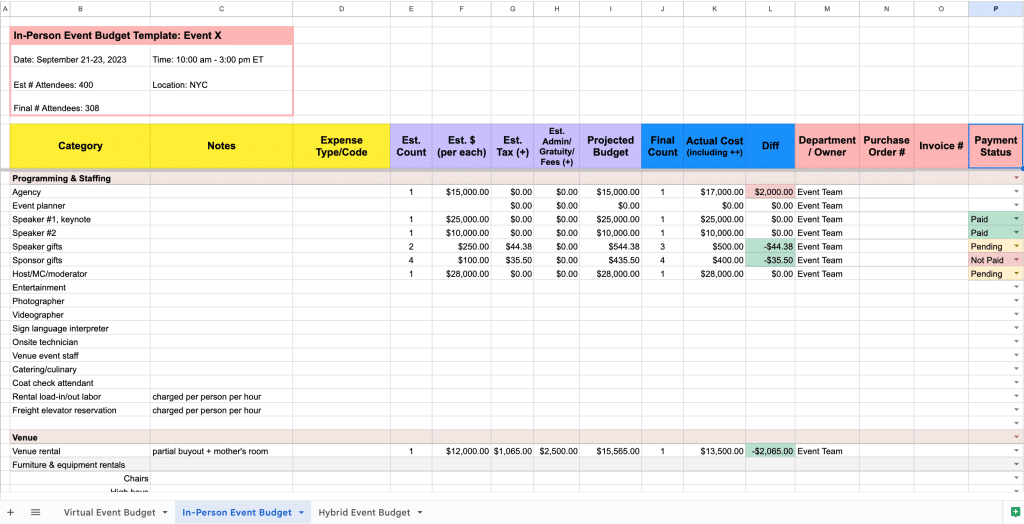3. Creative Budgeting Strategies

Tips to Make the Most of an Unrealistic Event Budget in Kenya
Getting creative with your budgeting approach can help you make the most of every shilling and create a great experience, even with a limited budget. These strategies allow you to keep costs low while still delivering a memorable event.
3.1 Reuse & Repurpose
Reusing and repurposing items from previous events is an excellent way to cut down on expenses and reduce waste.
-
Reuse Decorations and Props: Don’t throw away your event decorations or props after the event is over. Repurpose them for your next event. For example, if you’ve hosted a corporate event with elegant table settings or large branded banners, you can use them again for future events, potentially saving thousands on décor.
-
Repurpose AV Setups: If you’ve rented audio-visual equipment for a multi-day event or series of events, consider repurposing the setup. Instead of renting new equipment for each session or day, you can schedule the sessions consecutively, using the same equipment and crew. This will save on both rental and labor costs.
3.2 Limit Guest Numbers Strategically
The number of guests you invite can have a significant impact on your event budget. By limiting the guest list strategically, you can optimize your spending without losing the essence of your event.
-
Smaller Guest Lists = Reduced Costs: Reducing the number of attendees will cut down on costs related to the venue size, catering, and AV equipment. A smaller, more intimate event can still have a great atmosphere while minimizing the need for large-scale services.
-
Focus on High-Value Attendees: Rather than inviting everyone, think about which guests would bring the most value to your event. These could be high-profile speakers, donors, or key clients who can add prestige or potential business opportunities. A smaller group of carefully selected attendees can have a bigger impact and result in better ROI.
3.3 Optimize Your Schedule
The timing of your event can affect the budget significantly. By optimizing your event schedule, you can lower costs while still hosting a successful event.
-
Host During Off-Peak Times: Venues and service providers often offer discounts during off-peak times, such as weekdays or certain months of the year. Scheduling your event during these times can lead to substantial savings on venue rental and other services. Off-peak pricing can also extend to catering, audiovisual equipment, and even transportation services.
-
Minimize Event Duration: The longer your event runs, the more you’ll pay for labor (e.g., technicians, security, and catering staff), as well as venue and equipment rental. By shortening the duration of your event, you can reduce these hourly charges. A well-structured, focused event that sticks to a tighter schedule can be just as impactful without the extra time and cost.
3.4 Go Digital with Marketing
Digital marketing is often more cost-effective than traditional forms of advertising, and it allows you to reach a broader audience with less money.
-
Replace Physical Ads with Social Media Marketing: Instead of investing heavily in print ads, billboards, or posters, turn to social media platforms like Facebook, Instagram, LinkedIn, and Twitter. These platforms allow you to target your audience precisely, maximizing the impact of every shilling spent.
-
Utilize WhatsApp, Email, and SMS: These communication channels are highly effective and have a minimal cost. Use WhatsApp for direct invitations and event updates, email for detailed newsletters and registration information, and SMS for last-minute reminders and announcements. These tools are often more cost-effective than traditional physical mail campaigns and help you reach your audience instantly.
Creative budgeting strategies are all about being resourceful and making smart decisions that allow you to get the most value out of your budget. Whether it’s by reusing items from previous events, limiting guest numbers, optimizing your schedule, or going digital with marketing, each of these tactics can help reduce costs without compromising the quality of the event. With thoughtful planning and creativity, you can host an event that exceeds expectations while staying within budget.
4. Budget-Friendly AV Planning with Peak Audio

Tips to Make the Most of an Unrealistic Event Budget in Kenya
When planning an event on a tight budget, smart AV choices can make a huge difference. You don’t need to compromise on quality or experience by selecting budget-friendly AV solutions that still deliver exceptional results. Here’s how you can approach AV planning without breaking the bank:
4.1 Choose Cost-Effective AV Packages
For an affordable event, it’s important to focus on only the essential audio-visual equipment. This helps you avoid overspending while still ensuring that the event is well-supported with the necessary tech.
-
Select Essential Equipment: Focus on renting the core AV equipment that you’ll actually need, such as a sound system, a projector, and basic lighting. While it’s tempting to include advanced features like high-end LED screens or intricate stage setups, these can significantly increase your costs. Only rent what you need for the type of event you’re hosting, whether it’s a simple conference, fundraiser, or seminar.
-
Rent Rather Than Buy: When you’re on a tight budget, purchasing AV gear might not be a viable option. Instead, rent the equipment. Renting allows you to access high-quality equipment without the long-term financial commitment, and you can avoid maintenance costs associated with ownership. Additionally, renting ensures you’re only paying for what you need on the day of the event.
4.2 Bundle Services
Bundling services together can result in a much more cost-effective solution when planning an event.
-
Combine AV Rental with Event Setup and Technical Support: Many AV providers offer discounted rates when you bundle their services. By combining equipment rental with event setup, technical support, and on-site assistance, you can often save on both labor and equipment costs. This approach ensures that your event runs smoothly while also providing value for money.
-
Ask About Peak Audio’s All-In-One AV Deals: For clients looking for budget-friendly solutions, Peak Audio offers great all-in-one packages that include essential equipment, setup, and technical support. This can significantly reduce the overall cost compared to renting equipment and hiring separate support teams. These bundles are tailored for budget-conscious events while ensuring the tech doesn’t compromise the experience.
4.3 Get Expert Advice
Sometimes, the best way to save money is to get advice from the experts.
-
Book a Consultation with Peak Audio: Take advantage of free or affordable consultations with Peak Audio to discuss your AV needs. Their team can guide you through the best options for your event type and help you choose the most cost-effective solutions. An expert can ensure that you don’t overspend on unnecessary technology or equipment that might not align with your event objectives.
-
Avoid Overspending on Unnecessary Tech: By working with a knowledgeable AV provider, you can avoid the temptation to rent fancy equipment that won’t add value to your event. For instance, while advanced lighting setups might look impressive, they may not be necessary for your event’s goals, especially if your audience is more focused on the speakers or content. An expert will help you cut out the extras that could add unnecessary costs.
Planning a budget-friendly event without compromising on quality is possible with smart AV decisions. By choosing cost-effective packages, bundling services for better rates, and seeking expert advice, you can ensure that your AV setup meets your event’s needs without straining your budget. With Peak Audio’s affordable solutions and guidance, you can create an impressive experience that your attendees will remember—while keeping costs under control.
5. Sample Budget Comparison – Unrealistic vs. Strategic Planning
Event budgets are often a balancing act between expectations and actual financial realities. While an unrealistic budget may inflate categories due to high expectations or unnecessary features, a smart approach identifies areas where savings can be made without compromising quality. Below is a comparison showing how an unrealistic budget can be streamlined into a strategic, cost-effective plan.
5.1 Breakdown of Unrealistic vs. Strategic Budgeting
1. Venue Costs:
-
Unrealistic Plan (KES 120,000):
-
Premium Venues: The unrealistic budget allocates a significant amount to high-end venues (luxury hotels, large convention centers) with additional hidden costs (e.g., parking, cleaning fees).
-
What Could Be Done: By opting for affordable yet professional venues, such as community halls or smaller conference centers, costs can be cut without sacrificing the event’s quality.
-
Smart Plan (KES 60,000):
2. AV Equipment Costs:
-
Unrealistic Plan (KES 100,000):
-
Overestimated Tech Needs: The budget overstates the need for premium audio and visual equipment, such as top-of-the-line projectors, sound systems, and fancy lighting setups.
-
What Could Be Done: Stick to the essential tech (e.g., sound systems, basic lighting) and rent the equipment, avoiding the high cost of purchasing unnecessary items.
-
Smart Plan (KES 45,000):
3. Catering Costs:
-
Unrealistic Plan (KES 200,000):
-
Excessive Menu Offerings: This budget might include gourmet meals, expensive drinks, and complex setups like plated dinners or cocktail bars, pushing the catering costs higher.
-
What Could Be Done: Offer simple yet delicious meal options that meet guests’ needs (e.g., buffet-style meals, snack stations). Reduce excess by considering dietary restrictions carefully and offering varied options without going overboard.
-
Smart Plan (KES 95,000):
4. Entertainment Costs:
-
Unrealistic Plan (KES 50,000):
-
High-End Performers and Speakers: The unrealistic budget might allocate large sums to celebrity speakers or live performances, which are often unnecessary for most events.
-
What Could Be Done: Local talent or in-house professionals can add significant value without the hefty price tag. Focus on content and value over name recognition.
-
Smart Plan (KES 20,000):
-
Affordable Entertainment Options: Instead of celebrity guests, leverage local musicians, motivational speakers, or even well-organized panel discussions. Avoid spending heavily on entertainment that isn’t critical to the event’s success.
5. Marketing Costs:
-
Unrealistic Plan (KES 40,000):
-
Excessive Spending on Digital Ads and Print Materials: The unrealistic budget may allocate large sums for Facebook, Google, and Instagram ads, in addition to expensive printed promotional materials.
-
What Could Be Done: Shift focus to organic social media marketing, using low-cost platforms like Twitter, Instagram, and LinkedIn. Email marketing can also be highly effective at a fraction of the cost.
-
Smart Plan (KES 10,000):
-
Targeted, Low-Cost Marketing: Utilize free design tools to create flyers and posters, and focus digital marketing on free social media posts and email campaigns. Leverage word-of-mouth and local partnerships for additional promotion.
5.2 Cost-Saving Strategies for Budget Optimization

Tips to Make the Most of an Unrealistic Event Budget in Kenya
To maximize event impact without overspending, consider the following tips:
1. Choose the Right Venue:
2. Streamline AV Requirements:
3. Catering Efficiency:
-
Simplify the menu to keep catering costs within budget. Instead of extravagant plated meals, consider finger foods, platters, or buffets that offer variety but remain within an affordable range. Consider catering local or homemade options, which could provide quality at a reduced price.
4. Marketing Strategies:
-
Focus on free or low-cost channels for marketing your event. Leverage social media, word-of-mouth, and email newsletters. Consider collaboration with local businesses or sponsors to help promote the event at no additional cost.
5.3 Optimizing Your Budget for Maximum Impact
1. Focus on Impactful Elements

Tips to Make the Most of an Unrealistic Event Budget in Kenya
-
Maximize Attendee Experience: Allocate more budget to elements that have the most significant impact on your attendees’ experience, such as high-quality sound systems, visuals, and food. Guests remember the event’s ambiance, the ease of communication, and the quality of catering.
-
Essential AV Equipment: For example, instead of splurging on high-end lighting and visuals, focus on ensuring that sound and visuals are clear and functional. If budget allows, upgrade only the key components that will have the greatest impact on the overall atmosphere.
2. Negotiate with Vendors
-
Be Transparent About Budget Limits: Don’t shy away from negotiating with vendors. Explain your budget constraints and ask for discounts or bundled packages that can provide better value. Many vendors, especially in the event industry, are willing to offer discounts, especially when the business relationship is long-term.
-
Look for Sponsorships: Consider engaging potential sponsors to help cover costs or provide in-kind services. Offering visibility through event branding or promotional opportunities can incentivize them to contribute, reducing your out-of-pocket expenses.
3. Leverage Technology and Virtual Options
-
Hybrid and Virtual Components: Virtual or hybrid events can save significant money on venue and catering. Using live streaming platforms or digital tools for engagement can reduce the need for expensive physical setups while maintaining an engaging experience for attendees.
-
Utilize Free Tools for Promotion and Engagement: Platforms like Google Sheets for tracking, Canva for designing event materials, and social media for free marketing can help you save while still creating a polished, professional event.
4. DIY Where Possible
-
In-House Design and Setup: Instead of outsourcing everything, handle certain tasks in-house. For example, design your own invitations or use free tools to create event signage.
-
Volunteer Support: Tap into local volunteers for simple event-day tasks like ushering, registration, or serving. Volunteers often bring enthusiasm and energy, and you can allocate funds to more critical areas like catering and AV.
5. Prioritize Long-Term Value
-
Invest in Relationships Over One-Off Costs: Focus on creating lasting relationships with vendors who offer long-term value. By forming partnerships with reliable suppliers and service providers, you can negotiate better rates over time and ensure consistent quality.
-
Post-Event Marketing: Even after the event, consider using the content created (photos, videos, and feedback) for marketing future events, which could reduce the cost of new promotional efforts.
By focusing on these strategies and adopting a cost-conscious mindset, you’ll ensure that every dollar spent contributes directly to the success of your event, providing attendees with a memorable experience without sacrificing quality or exceeding your budget.
Partner with Peak Audio for the Best and Budget-Friendly Unforgettable Events

Tips to Make the Most of an Unrealistic Event Budget in Kenya
An unrealistic budget doesn’t have to mean compromising on quality or experience. It’s merely a challenge that can be overcome with the right planning and smart decisions. By prioritizing key elements and making strategic choices, you can still craft an impactful event that exceeds expectations.
With the right partnerships and solutions, such as those offered by Peak Audio, even budget-conscious events can shine. Their expertise in providing cost-effective AV solutions ensures you get top-tier equipment without blowing your budget.
Let Peak Audio help you navigate the complexities of event planning, delivering value without compromising on quality. Together, we can plan, execute, and create memorable events in Kenya. For more information, visit Peak Audio.










